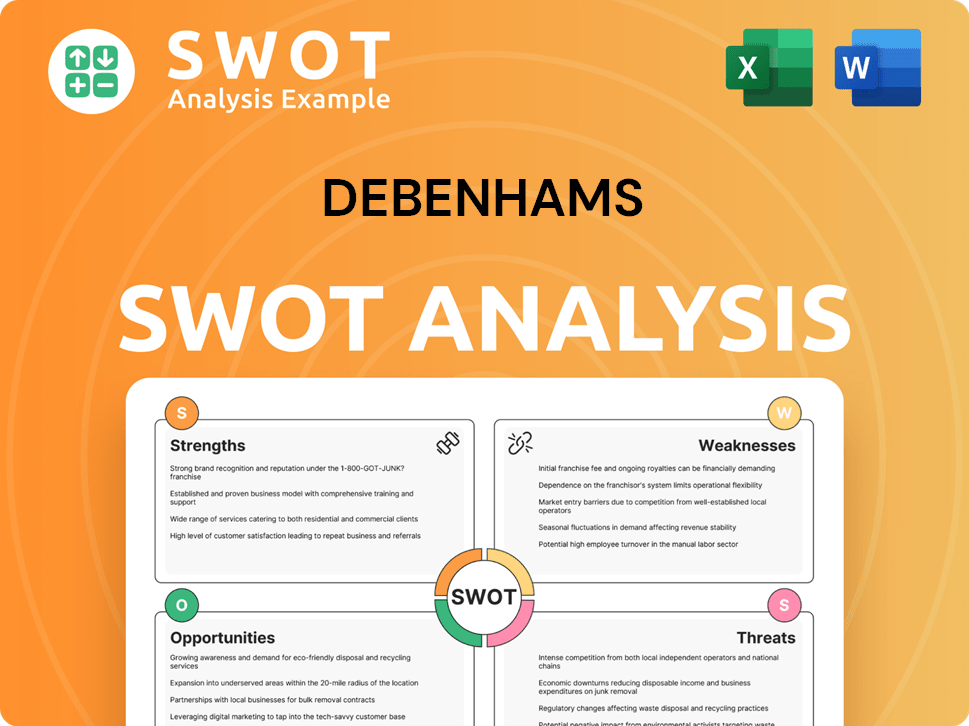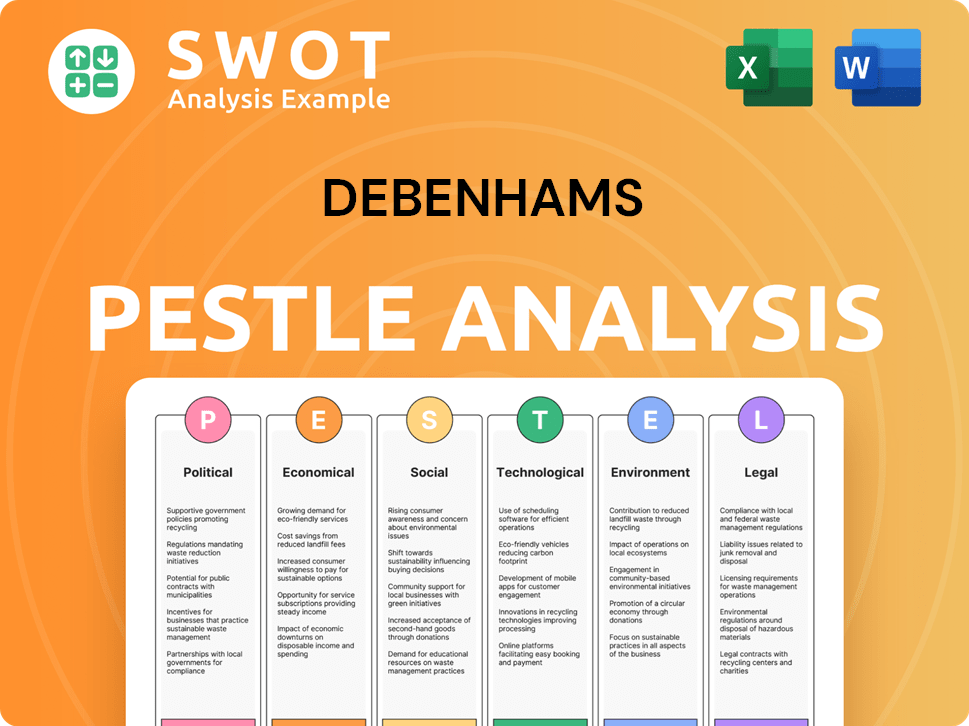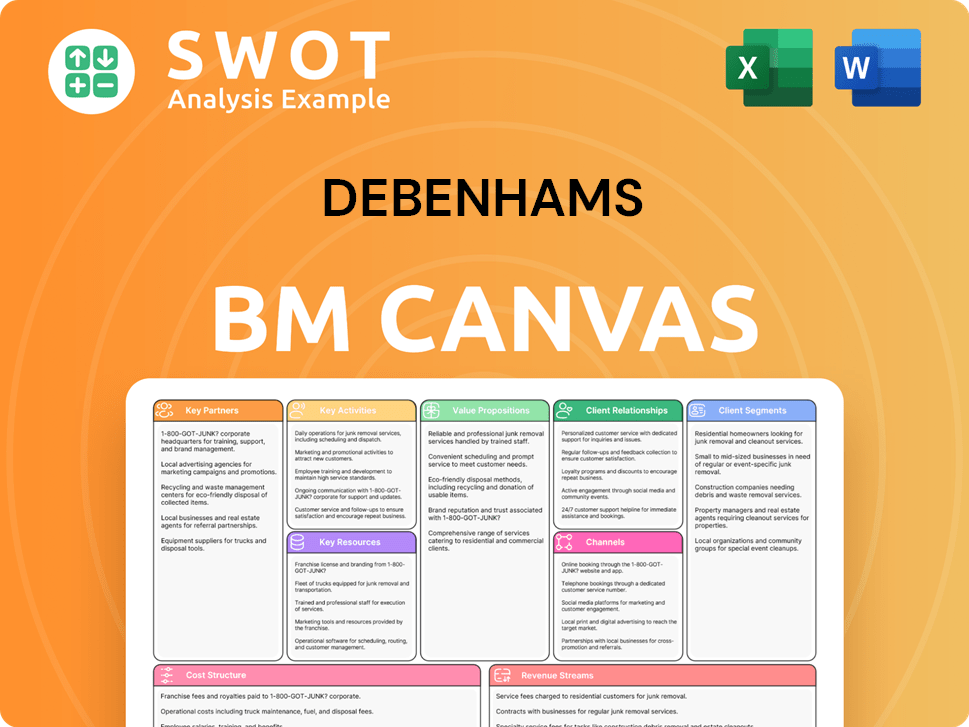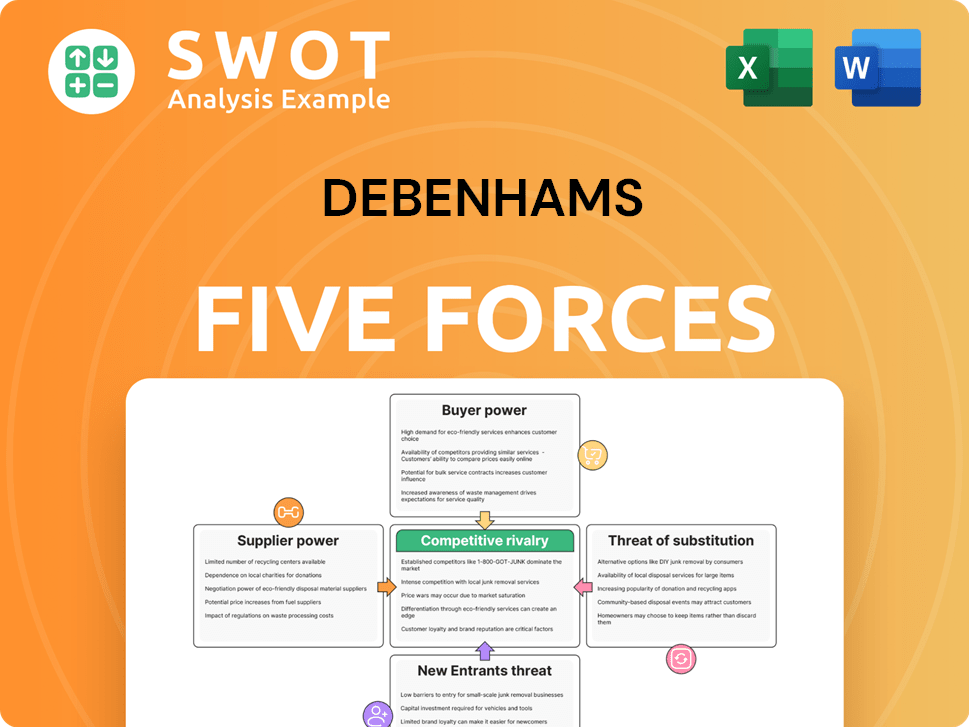Debenhams Bundle
How is Debenhams Redefining Retail in 2025?
The transformation of Debenhams from a historic department store to a dynamic online marketplace under Boohoo Group's ownership presents a compelling case study in retail adaptation. This strategic shift, culminating in the March 2025 rebranding, showcases how a legacy brand can reinvent itself to thrive in the digital age. Understanding Debenhams' current approach is crucial for anyone tracking the evolution of retail and e-commerce.

Debenhams' Debenhams SWOT Analysis highlights the company's strategic moves to navigate the competitive landscape. This deep dive will explore the intricacies of Debenhams' sales strategy, examining its online sales channels and how it drives revenue. We'll also uncover the Debenhams marketing strategy, including its digital marketing initiatives and customer relationship management strategy, to understand how it engages its target audience and builds brand loyalty. The Debenhams business model, post-bankruptcy strategy, and future marketing plans will also be considered, providing a comprehensive Debenhams market analysis.
How Does Debenhams Reach Its Customers?
The core of the Growth Strategy of Debenhams revolves around its online marketplace, Debenhams.com. This digital platform serves as the primary sales channel, enabling the company to reach a broad customer base. The marketplace model allows third-party brands to sell their products, which diversifies revenue streams and reduces inventory risks.
This strategic shift from a multi-channel approach, which included physical stores, to a purely online model was a crucial adaptation to evolving consumer preferences. The online sales channel has proven to be a resilient and growing aspect of the business. The platform now features approximately 10,000 brands, reflecting an expansion plan under CEO Dan Finley's marketplace strategy.
The transformation of Debenhams' sales channels is a significant aspect of its overall strategy. Following its acquisition by Boohoo Group in 2021, the company transitioned to an exclusively online model, closing all physical stores. This strategic pivot was driven by the surge in e-commerce and changing consumer behaviors. The online platform has shown substantial growth, with Debenhams reporting a 65% year-on-year rise in revenues for the year ending February 29, 2024.
Debenhams.com is the primary sales channel, functioning as an online marketplace. This allows third-party brands to sell through the platform. This approach diversifies revenue streams and reduces inventory risk, a key element of the Debenhams business model.
The company transitioned from a multi-channel approach to a purely online model. This strategic shift was driven by the rise of e-commerce and changing consumer behaviors. Following the acquisition by Boohoo in 2021, the physical stores were closed.
Debenhams reported a 65% year-on-year rise in revenues for the year ending February 29, 2024. The company achieved a pre-tax profit of £4.5 million, a significant turnaround. Online revenue for Debenhams.com reached US$40.2 million in 2024.
Debenhams is focusing on expanding its online presence internationally. Plans include launching new websites in Ireland and Australia before Christmas 2024. A new fulfillment service was introduced in late 2024, enhancing the customer experience.
Debenhams is implementing several strategic initiatives to enhance its sales channels and overall market position. These initiatives include international expansion and improved fulfillment services. These efforts are part of Debenhams' marketing strategy to drive growth and improve customer experience.
- International Expansion: Launching new websites in Ireland and Australia.
- Fulfillment Services: Introducing a new service for brand partners.
- Customer Experience: Enhancing the customer experience through efficient delivery options.
- Brand Partnerships: Offering a wide range of brands to customers.
Debenhams SWOT Analysis
- Complete SWOT Breakdown
- Fully Customizable
- Editable in Excel & Word
- Professional Formatting
- Investor-Ready Format

What Marketing Tactics Does Debenhams Use?
The marketing tactics employed by Debenhams, now operating as an online marketplace under the Debenhams Group, are heavily focused on digital strategies to build brand awareness and drive sales. Their approach includes a mix of innovative digital marketing initiatives, such as social media campaigns and influencer partnerships, to engage customers and boost brand visibility. This shift to e-commerce and digital marketing is central to their strategy to reach a wider audience and remain competitive in the evolving retail landscape. The Brief History of Debenhams shows how the company has adapted over time.
Debenhams' marketing mix has undergone significant changes, prioritizing an omnichannel approach to provide a seamless shopping experience across all online and offline channels. This includes features like click-and-collect services and personalized recommendations based on online browsing behavior, even though physical stores are no longer part of the model. The company is also actively investing in technology to enhance the customer experience, with plans for an AI room builder and existing features like virtual advisors and virtual try-on services.
Data-driven marketing and customer segmentation play a crucial role in Debenhams' strategy, allowing them to understand customer preferences and tailor product offerings. Furthermore, customer loyalty programs and rewards are used to incentivize repeat purchases and foster customer loyalty. The integration of AI in marketing is expected to mature in 2025, with businesses integrating AI more formally into their data workflows, which aligns with Debenhams' technological investments.
Debenhams leverages digital marketing initiatives to reach a wider audience. These include social media campaigns and influencer partnerships to promote products and engage customers. The focus is on boosting brand visibility and driving sales through online channels.
Debenhams employs an omnichannel approach to provide a cohesive shopping experience. This includes features like click-and-collect services and personalized recommendations. The goal is to ensure a seamless experience across online and offline channels.
Investing in technology is key to enhancing the customer experience. Debenhams plans to use AI room builders and virtual advisors. Virtual try-on services for beauty products are already in place, with expansion planned for fashion.
Data-driven marketing is crucial for understanding customer preferences. Debenhams focuses on adapting product offerings based on customer segmentation. Customer loyalty programs are also used to incentivize repeat purchases.
The role of AI in marketing is expected to mature in 2025. Debenhams is integrating AI into its data workflows. This aligns with the company's technological investments to improve marketing effectiveness.
Customer loyalty programs and rewards are used to incentivize repeat purchases. These programs help foster customer loyalty. The aim is to build strong customer relationships.
Debenhams' sales and marketing tactics are designed to maximize online presence, improve customer experience, and drive sales. These strategies are crucial for maintaining a competitive edge in the retail market. The company focuses on several key areas to achieve its goals.
- Digital Marketing Campaigns: Debenhams uses social media and influencer partnerships to build brand awareness and reach a wider audience. These campaigns are designed to engage customers and promote products effectively.
- Omnichannel Experience: The company focuses on providing a seamless shopping experience across online and offline channels. This includes features like click-and-collect and personalized recommendations to enhance customer convenience.
- Customer Experience Enhancement: Debenhams invests in technology to improve customer experience, including virtual advisors and try-on services. These tools aim to increase customer engagement and confidence.
- Data-Driven Marketing and Segmentation: Understanding customer preferences is key. Debenhams uses data to adapt product offerings and segment its market effectively. This allows for personalized marketing and better targeting.
- Customer Loyalty Programs: Loyalty programs and rewards are used to incentivize repeat purchases. These programs help build customer loyalty and encourage repeat business.
Debenhams PESTLE Analysis
- Covers All 6 PESTLE Categories
- No Research Needed – Save Hours of Work
- Built by Experts, Trusted by Consultants
- Instant Download, Ready to Use
- 100% Editable, Fully Customizable

How Is Debenhams Positioned in the Market?
The brand positioning of Debenhams centers around its identity as 'Britain's online department store.' This strategy leverages the company's established heritage and brand recognition to offer a wide array of products, including women's and menswear, beauty items, children's wear, and home goods. This approach aims to attract both returning and new customers, emphasizing a broad product selection and a seamless shopping experience.
Since its acquisition in 2021, Debenhams has successfully repositioned itself, aiming to become a 'lean, fast, and technologically advanced' value generator. This reputation is something the broader Debenhams Group seeks to emulate. The company's approach is to maintain brand consistency through a multi-channel strategy, offering a smooth shopping experience across its online platform. This includes being responsive to shifts in consumer sentiment, such as the growing focus on environmental issues.
Debenhams differentiates itself through a diverse brand selection, featuring luxury labels like YSL and Prada alongside well-known brands such as Lego. This multi-brand strategy caters to a broad customer base, positioning Debenhams as a one-stop shop. The company also responds to consumer trends, incorporating eco-friendly product lines and ethical sourcing to differentiate itself in a competitive market. For an overview of the competitive landscape, you can explore the Competitors Landscape of Debenhams.
Debenhams offers a broad selection of products across various categories. This strategy includes a mix of luxury and well-known brands to appeal to a diverse customer base. This extensive range supports its position as a one-stop shopping destination.
The company focuses on providing a smooth and consistent shopping experience across its online platform. This includes user-friendly navigation and efficient checkout processes. This approach enhances customer satisfaction and encourages repeat business.
Debenhams maintains brand consistency through its multi-channel strategy. This ensures a unified brand image and shopping experience across all touchpoints. This approach is crucial for reaching a wider audience and maintaining customer loyalty.
Responding to consumer demand, Debenhams incorporates eco-friendly product lines and ethical sourcing practices. This commitment helps differentiate the brand in the competitive market. This strategy also aligns with the growing consumer preference for sustainable products.
The company aims to be a 'lean, fast, and technologically advanced' value generator. This repositioning focuses on efficiency and innovation. This approach is designed to enhance profitability and adapt to changing market dynamics.
Debenhams targets a broad customer base with its diverse brand selection. This includes a mix of luxury and mainstream brands. This wide appeal supports the company's goal of being a comprehensive retail destination.
Debenhams Business Model Canvas
- Complete 9-Block Business Model Canvas
- Effortlessly Communicate Your Business Strategy
- Investor-Ready BMC Format
- 100% Editable and Customizable
- Clear and Structured Layout

What Are Debenhams’s Most Notable Campaigns?
The sales and marketing strategy for Debenhams focuses on leveraging key promotional periods and strategic brand initiatives. These efforts are designed to drive immediate sales and enhance customer engagement. The company employs targeted campaigns and strategic rebranding to strengthen its market position and drive overall growth.
A significant aspect of the Debenhams sales strategy involves capitalizing on high-traffic shopping events. These events, such as Black Friday and Boxing Day, are crucial for boosting revenue and attracting a broad customer base. The brand's approach combines aggressive discounts with strategic marketing to maximize sales during these crucial periods.
The company's marketing strategy also includes initiatives to build community and enhance brand recognition. By focusing on well-known brands and marketplace models, Debenhams aims to increase customer engagement and expand its reach. This strategy is supported by strategic rebranding efforts and a focus on digital marketing.
Debenhams actively participates in major online shopping events like Black Friday and Cyber Monday. These events are critical for driving substantial sales and attracting a large customer base. The company's promotions during these periods are designed to offer significant discounts and special offers.
The 'biggest-ever Boxing Day sale' in December 2024, with discounts up to 75% and an additional 20% off on over 10,000 lines, was a key sales driver. A January 2025 flash sale offered up to 75% off fashion brands. These events are designed to clear inventory and attract bargain hunters.
The Christmas campaign in late 2024 received positive customer feedback, contributing to sales growth. The campaign focused on building a community through the adoption of select brands across fashion, home, and beauty. This approach aims to create a strong brand identity and increase customer loyalty.
The strategic rebrand to Debenhams Group in March 2025, following a successful turnaround, is a major campaign. This rebrand leverages the Debenhams brand's heritage and online marketplace success to drive growth across the group. This move aims to strengthen brand recognition and enhance relationships.
Debenhams Porter's Five Forces Analysis
- Covers All 5 Competitive Forces in Detail
- Structured for Consultants, Students, and Founders
- 100% Editable in Microsoft Word & Excel
- Instant Digital Download – Use Immediately
- Compatible with Mac & PC – Fully Unlocked

Related Blogs
- What are Mission Vision & Core Values of Debenhams Company?
- What is Competitive Landscape of Debenhams Company?
- What is Growth Strategy and Future Prospects of Debenhams Company?
- How Does Debenhams Company Work?
- What is Brief History of Debenhams Company?
- Who Owns Debenhams Company?
- What is Customer Demographics and Target Market of Debenhams Company?
Disclaimer
All information, articles, and product details provided on this website are for general informational and educational purposes only. We do not claim any ownership over, nor do we intend to infringe upon, any trademarks, copyrights, logos, brand names, or other intellectual property mentioned or depicted on this site. Such intellectual property remains the property of its respective owners, and any references here are made solely for identification or informational purposes, without implying any affiliation, endorsement, or partnership.
We make no representations or warranties, express or implied, regarding the accuracy, completeness, or suitability of any content or products presented. Nothing on this website should be construed as legal, tax, investment, financial, medical, or other professional advice. In addition, no part of this site—including articles or product references—constitutes a solicitation, recommendation, endorsement, advertisement, or offer to buy or sell any securities, franchises, or other financial instruments, particularly in jurisdictions where such activity would be unlawful.
All content is of a general nature and may not address the specific circumstances of any individual or entity. It is not a substitute for professional advice or services. Any actions you take based on the information provided here are strictly at your own risk. You accept full responsibility for any decisions or outcomes arising from your use of this website and agree to release us from any liability in connection with your use of, or reliance upon, the content or products found herein.